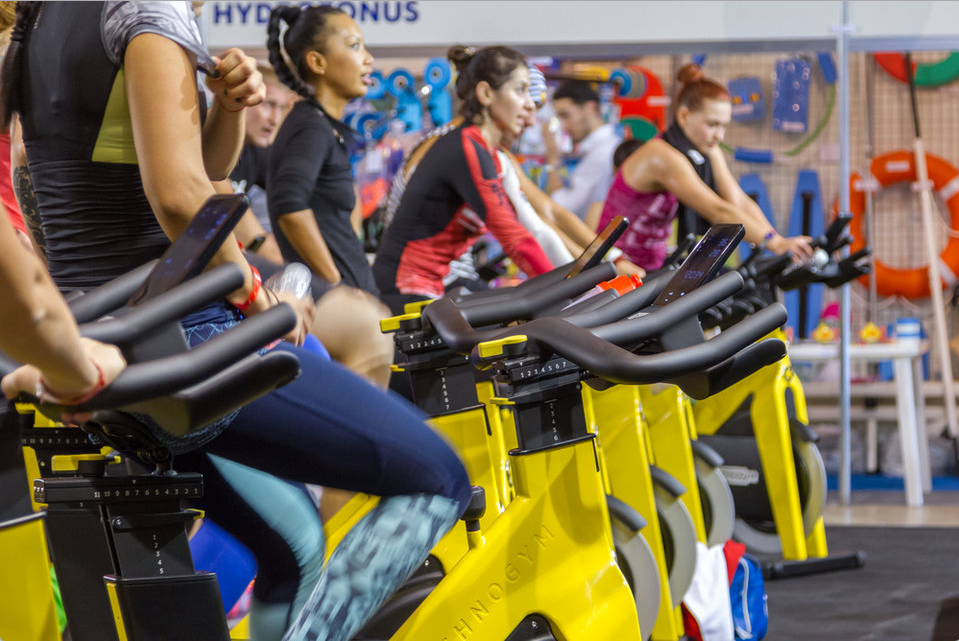
- After her first spin class, Kaelyn Franco's legs became swollen and she could barely walk.
- She'd developed potentially deadly conditions and needed IVs and leg surgery to survive.
- Rhabdo may be on the rise in the pandemic with people jumping back into fitness too intensely.
Kaelyn Franco wanted to keep cycling when the weather turned cooler this fall, so she signed up for an indoor spin class at her new gym. It was her first.
The 23-year-old in Marlborough, Massachusetts, told Today she thought she pushed herself appropriately.
But when she got off the bike, her knees buckled. The next day, her legs were swollen and tense. Franco chalked it up to muscle "gainz," she said on TikTok. But soon, she couldn't walk without grabbing countertops and her urine turned brown.
Franco went to the hospital, where she learned she'd developed severe rhabdomyolosysis, a rare condition caused when muscle tissue breaks down rapidly and releases a protein called myoglobin into the bloodstream. When the kidneys can't filter it fast enough, it turns a person's urine Coke-colored and can lead to organ failure and death.
Franco also developed acute compartment syndrome in her right leg, a condition in which building pressure in the legs dangerously limits blood flow.
"Doctors were getting concerned at this point so they brought in a bunch of specialists to monitor me," she said on TikTok.
To treat her, doctors gave her with IV fluids to flush out the proteins and later cut open her leg to relieve the building pressure. Had she not undergone the surgery in time, she may have needed or leg amputated or died, she said a doctor told her.
Now, almost two months later, Franco needs crutches to walk.
"I want to shed light to a topic that's not really known about, not really talked about, and it's important to be cautious of these things because there's a big prevalence in spin classes lately," she said on TikTok.
Rhabdo may be on the rise
There are so few documented cases of exercise-induced rhabdo that it's tough to know how common it is.
But media and case reports have described it in people after CrossFit workouts, boot camps, SoulCycle sessions, half-marathons, and hiking the Grand Canyon.
The pandemic may have prompted more cases.
One Reddit user and Peloton enthusiast wrote in February that he suffered from the condition three times on his path to losing 40 pounds during the pandemic. In August 2020, the dancer Ashley Elizabeth Daigle wrote in Dance Magazine that after recovering from COVID-19, a 15-minute ab workout led to rhabdo, which nearly destroyed her career.
And personal trainer Jamie Hickey told Insider he was sidelined with rhabdo after a weight-loss competition with his brother went too far.
Commenters on Franco's post also suggested the condition is more prevalent than most people realize.
"Spin class did the same to me!" one person wrote. "I was in the hospital for almost a week. Keep in mind the spin class was labeled a 'beginners' class."
"Omg my friend went to one class and ended up with kidney failure and dialysis for a month," another said.
"Same! hospitalized for a week in April, can't do a spin class ever again according to doctors," another commenter wrote. "Took 6 months of physical therapy to feel normal again."
Preventing rhabdo
Accidents, like a serious car crash that crushes the muscles, can also cause rhabdo, but among exercisers, it's most likely to strike from intense full-body exercises like CrossFit in which more muscle proteins are liberated.
Both fitness newbies and folks in good shape can be at risk.
"It's typically people either that haven't been exercising much at all and then go zero to 60, or people that are in fairly good shape but have taken a break for a long period of time, and then they get back into it too fast," Dr. Jordan Metzl, a sports-medicine physician, previously told Insider.
To minimize your risk, don't push yourself to exhaustion. Know the difference between sore muscles and rhabdo's telltale signs: muscle pain, weakness, and dark urine. When in doubt, seek medical help right away and drink a lot of fluids.
"You can work very, very hard, and most people won't get rhabdo," Metzl said. "The key takeaway is to build things up gradually."
